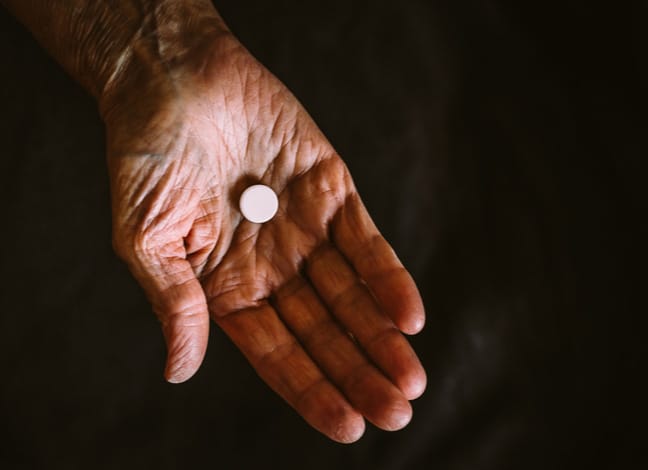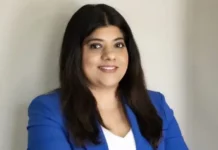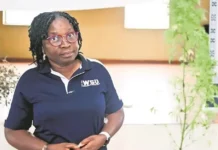Ida Ruggiero, an opinionated great-grandma, remembered the deep embarrassment that crept over her when she told each of her five adult children her news.
Ruggiero, 81, was using weed, twice a day. With her doctor’s permission, of course.
Yes, the same substance that she had sternly warned them not to try when they were teens growing up in a middle-class home in South Jersey in the ’60s.
“I used to threaten that I would beat them,” Ruggiero, a former school board member, said a few hours after she had popped a piece of a cannabis lozenge. None of her now-adult children objected to her decision to use it, she said.
Ruggiero is among a small but growing group of people in their 80s and 90s who have decided to experiment with marijuana, still an illegal substance under federal law. A majority of states have legalized it to treat a wide array of ailments and its popularity is rising.
Seventy percent of millennials favor legalization, for any reason, and a clear majority of baby boomers support both medicinal and recreational marijuana. In stark contrast, only 35 percent of those over age 72 approved of it, according to a Pew Research Center report released in January. Still, that’s up from 29 percent in a 2015 Pew study.
The 2015 Pew report dug deeper and found “supporters of legalization mention its perceived health benefits, or see it as no more dangerous than other drugs. To opponents, it is a dangerous drug, one that inflicts damage on people and society more generally.” The report said 52 percent of millennials had tried marijuana, but only 19 percent of the elderly have used it.
But as marijuana goes mainstream, even those who are up in years are starting to ask, “Why not me?” although Medicare does not cover it.
Five marijuana patients, ages 81 to 93, who live in New Jersey, where medical marijuana has been legal for eight years, agreed to be interviewed for this article. All five said that they were glad they tried it, as seniors, for the first time.
Most use the edible form because it’s easier than smoking it and doesn’t leave a telltale odor that makes them feel sheepish when visitors come to their home or assisted-living facility.
One Marlton woman learned about medical marijuana over a mah-jongg game at an independent-living facility during which two elderly players admitted they were using it and recommended it. She decided to give it a whirl and was stunned at how it eased her back pain and helped her sleep.
Declining to be named, she told a reporter that she doesn’t want her neighbors to think she’s “a dopehead. … The marijuana doesn’t get me high, it’s just for pain,” she said.
Ruggiero, who has eight grandchildren and 10 great-grandchildren, also said marijuana does not make her giddy or giggly. “Only once did I feel the least bit screwy.” During a recent interview Ruggierio came across as intelligent and well-spoken.
Diana Marino, a nurse and Ruggiero’s granddaughter, suggested her “mom-mom” try it. “She has improved mentally and physically. I see a difference, and that in itself brings me happiness,” she said.
Ruggiero said she has noticed her anxiety is now manageable, her depressed mood has improved, and her arthritis hurts less. But she admits that she still looks for “excuses to stop.”
She still has concerns. Years ago, she said, there was a widespread belief that marijuana use would create a “white spot on your brain” that would be permanent. “This was hammered into us.” She said that she now knows that is false, but the fear lingers.
When Ruggiero first tried cannabis more than a year ago, she smoked it in a pipe, but it worsened her lung condition. Then, she experimented with a $300 vaporizer, but she didn’t get results. Converting it into oil also didn’t work, and dissolving a lozenge under her tongue tasted awful, she said.
A couple of months ago, Bob Kane, a cannabis educator who works in her doctor’s office, suggested she break the lozenges into pieces and swallow them, like pills, a few hours apart.
Ruggiero said that made a difference. Now, she takes 2.5 lozenges a day. They cost $60 for a pack of 35 at the dispensary.
Kane, who works for Andrew Medvedovsky, a board-certified neurologist with six marijuana clinics across New Jersey, said that elderly patients require extra counseling and follow-up care. “They’re scared; they’re often alone,” Kane said. “They worry they will feel loopy and lose their balance.”
Medvedovsky, who has recommended cannabis for more than 3,000 pain patients, said that only a fraction of his patients are older than 80. About five are between 90 and 99, he said. Most patients are in their 50s and 60s.
Many older patients are willing to try marijuana after other medications failed or produced unwanted side effects, he said. “We are getting mixed results,” he said. “A lot comes down to their underlying conditions and overall health. … Also, there’s so much anxiety about cannabis, about being high and not in control, and anxiety would limit their success.”
Beverly Klein, 82, learned about marijuana from the internet. An article suggested marijuana could help patients get off steroids. For several years, she took prednisone for polymyalgia rheumatica, an inflammatory condition that causes pain and stiffness. She was up to four pills a day.
“I knew it was bad for me and I had to take more and more to relieve the pain,” she said. “I’m not ashamed of using marijuana – it’s my decision what I do with my body,” said Klein, a great-grandmother.
Klein’s friends at her assisted-living facility in Voorhees were afraid for her. “They are waiting for me to die,” she said, saying that her generation was taught “marijuana kills.”
After nearly three months on marijuana, Klein halved her steroid use. At the time of the interview, she expected to be completely weaned off shortly.
But Klein felt ill a few weeks ago. Her doctor told her to immediately stop using the marijuana because it was the newest medication she took.
“I have to do what he says because I’m feeling lousy,” she said. “I have no regrets — I think marijuana probably works for 99 percent of the people.”
Klein said too few doctors are familiar with how marijuana affects the elderly and how it should be administered to patients who have a host of medical issues.
Many cannabis patients say there is a severe shortage of doctors in the state who are willing to recommend cannabis to their patients, partially due to the stigma. Health Commissioner Shereef M. Elnahal recently began a series of lectures to make doctors aware of the potential benefits.
Another problem, health officials say, is that current rules make it difficult for caregivers to bring cannabis to nursing homes and hospice patients, though it might help with nausea and lack of appetite.
An 88-year-old Cape May man, who lives at home, said he was glad that he was able to get to the dispensary. Cannabis saved his life, he said. Without an appetite, he lost 70 pounds and was dangerously frail. He now smokes it at night and enjoys dinner. In the last four years, he said, marijuana has helped him gain 30 pounds.
David Knowlton, the CEO of the Compassionate Care Foundation dispensary in Atlantic County, said that he and others in the industry support bills that would allow cannabis to be delivered to nursing homes and hospice centers.
“We know there’s a need for this,” he said. “We have a lot of patients coming in with walkers and wheelchairs and there are many more people who can’t get here.”











